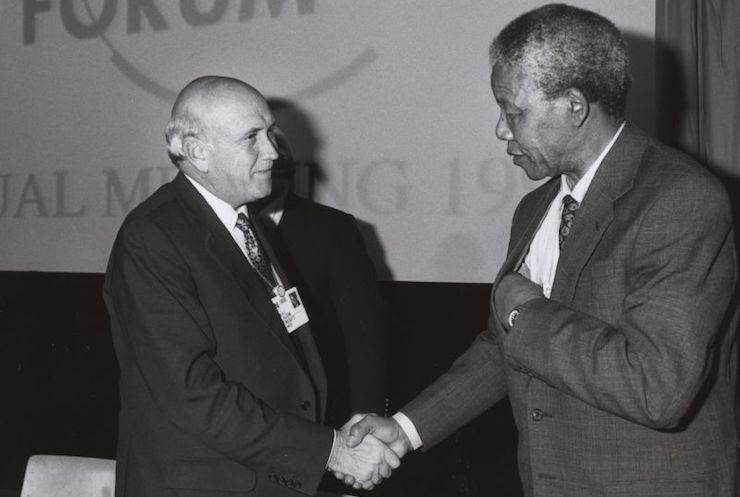What can the Israeli left learn from South Africa? Instead of trying to defeat its right-wing rivals, the opposition should propose a platform of equality and humanism.
By Liel Maghen

It’s not uncommon for the history of South Africa to come up when discussing the history and present of Israel-Palestine. There are those who compare Israel’s regime in the occupied territories to South Africa’s Apartheid regime, while others recall the movement to boycott South Africa as a means of applying the same kind of pressure to Israel. Then there are those who find inspiration in the transitional justice of the Truth and Reconciliation Committee, hoping one day to establish a similar committee that would bring justice to those living between the Jordan River and the Mediterranean.
But there is an additional similarity that has largely gone undiscussed: the fate of South Africa’s main opposition party. These days as Labor, Israel’s main opposition party. continues to veer toward the center and blurs the differences between itself and the nationalist right, we can stand to learn the lessons of another opposition party that didn’t do enough to challenge the regime.
The wrong side of history
Following the Boer Wars, where independent republics established by European settlers in what would become South Africa launched a rebellion against the British Empire, four former British colonies were united in 1910 to form the Union of South Africa.
Despite its aspirations to promote a moderate agenda, various political considerations engendered a different set of policies. During the first decade of its rule, the SAP brought the rival National Party, which supported racial separation and discrimination, into its coalition. When the National Party won the elections a few years later, the SAP did not hesitate to join its coalition. Following the 1933 elections, when it failed to make significant electoral gains, SAP gave up almost entirely on its moderate platform and merged with the National Party to form the United South African National Party. The union enabled SAP to join the government for a long period until 1948, when the union was dissolved.
Since that year, it seems the party has missed every opportunity to be on the right side of history. Although more liberal than the National Party, which was responsible for enacting the Apartheid legislation, SAP never made opposition to discrimination a central tenet of its policy. Moreover, it never actually laid out how it was planning implement its moderate agenda principles under a regime based on racial supremacy.
In addition, SAP decided to cast aside, rather than embrace, the growing opposition to Apartheid. Consequently, in 1959 SAP lost support to the nascent Progressive Party, which hoped to position itself as a stauncher opponent to the regime, while in 1975 SAP decided to expel members who signed a convention for full civil equality. The party’s internal fighting, coupled with disagreements about the future of the regime, brought about the party’s demise in 1977. The Progressive Party would come to fill SAP’s void, laying out a clear platform committed to changing the regime and establishing a multi-racial federation.

The lack of a real opposition allowed the National Party to remain in power from 1948 until the fall of Apartheid in 1994. Despite its platform, the nationalists were the ones to actually lead the dissolution of the Apartheid regime; their hawkish leader, F.W. de Klerk, would go on to win the Nobel Peace Prize. As opposed to the National Party, SAP has been long forgotten, despite its initial successes during and after South Africa’s founding. In retrospect, its center-left policies are nothing less than confounding, and its internal battles seem negligible in the face of the injustices carried out by the regime.
Risky steps for real change
Between the lack of a clear position against the regime, entering coalitions or unions with the nationalist parties, or dealing with internal strife, one sees many similarities between SAP and Mapai, the predecessor to Israel’s Labor Party. Both parties repeatedly found a common denominator with their country’s nationalist forces, while compromising on their basic democratic principles. And beyond issues of morality, both SAP and Mapai made significant, long-term political mistakes.
Under a belligerent regime with weakened democratic institutions, there is no need for parties to try and reconfigure discrimination or present a weak alternative to the rule of the right. Parties that lack a clear ideology against the establishment will dissolve into the regime, while those with a real backbone, like South Africa’s Progressive Party, last in the long run.

As long as opposition parties merely seek to replace the ruling party and lead the government without tackling the very nature of the discriminatory regime, they will always appear as a pale shadow of their more nationalist rivals. Political change requires taking an unequivocal stand, and the left will only benefit if it proposes a platform based on equality and humanism, which puts forth a real alternative to the existing political reality. This might be a risky political step, but it is necessary to lead the way toward real change.
The real question is whether there will be a leader among the Zionist left who will be willing to take this step. Currently, it appears that members of the opposition parties prefer to remain within the confines of their imaginary camp — a decision that won’t bring about a change in the ruling party and will only serve to entrench the current regime until such an alternative appears on the scene.
Liel Maghen is the co-director of IPCRI, a staff member at the Glocal program for International Development at the Hebrew University, and member of the steering committee for Standing Together. This article was first published in Hebrew on Local Call. Read it here.
